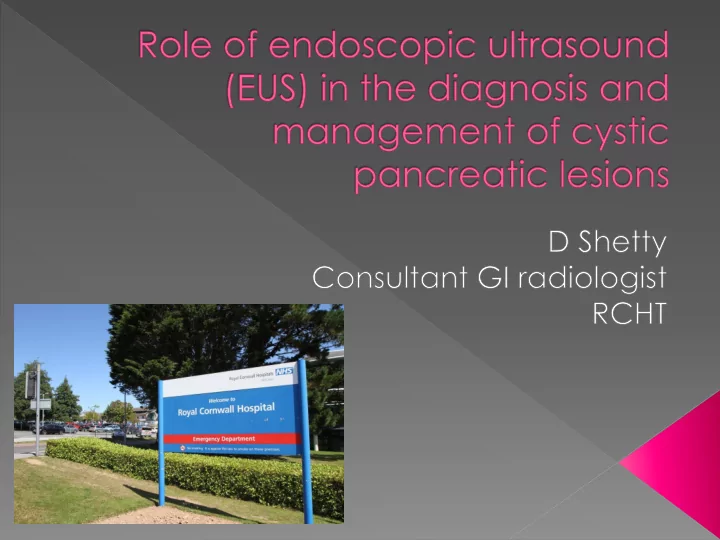

EUS: past, present and future Update on revised Fukuoka guidelines (2017) Review of cystic pancreatic lesions: CT / MRI / EUS When to stick a needle in?
1700s Spallanzani: Ultrasound guided navigation in bats c1880 Jacque and Pierre Curie: Piezoelectric effect 1940 - 1950 Dussik / Wild & Reid: Ultrasound for medical diagnosis 1980 - 1982 DiMagno: First EUS examinations
High risk stigmata Obstructive jaundice secondary to cyst • Enhancing mural nodule ( ≥ 5mm) • Main pancreatic duct ≥ 10mm • Worrisome features Clinical: Pancreatitis • Imaging: Cyst ≥ 30mm • Enhancing mural nodule < 5mm Thickened / enhancing cyst walls Main pancreatic duct 5-9mm Pancreatic duct stricture Lymphadenopathy Raised CA 19-9 Cyst growth ≥ 5mm/ 2 years
Viscosity Amylase CEA Cytology
Serous Mucinous IPMN Pseudocyst cystadenoma cystic (SCA) neoplasm (MCN) Viscosity + ++ / +++ +++ + Amylase + + / ++ ++ / +++ +++ CEA + ++ / +++ ++ / +++ + Cytology Glycogen Mucinous Mucinous Histiocytes + Low ++ Moderate +++ High
Cystic lesion Positive marker Sensitivity Specificity SCA VHL 74-100% 84-95% chr3 LOH MCN None 74-100% 97-95% IPMN GNAS 66-84% 85-99% RNF43 chr39 LOH Chr1q aneu
2.5% of pancreatic exocrine tumours > 95% female predominance Surgical lesions: › 2/3 slow-growing cystadenomas › 1/3 malignant cystadenocarcinomas Often unilocular in body / tail Cyst fluid › High CEA › Mildly elevated / high amylase
Benign Older women Septated Calcified Microcystic Pancreatic head Cyst fluid › Low CEA › Normal / Low amylase › Glycogen on cytology
Key question Possible diagnosis Demographics / Male MCN unlikely History No history of Pseudocyst unlikely pancreatitis MEN Cystic neuroendocrine tumour VHL Serous cystadenoma Imaging Central Serous cystadenoma calcification Head of the MCN unlikely gland Cyst fluid High CEA / High IPMN amylase High CEA / Mildly MCN elevated amylase Low CEA / High Pseudocyst amylase Malignant SCA: Very rare potential MCN: Moderate to high IPMN: Low to high Pseudocyst: None
Diagnostics › Fluid analysis markers › EUS micro-forceps Therapeutics › EUS guided RFA
Predominantly an incidental finding › High risk / worrisome features Patient centred, MDT focussed management Novel diagnostic techniques just around the corner
Recommend
More recommend